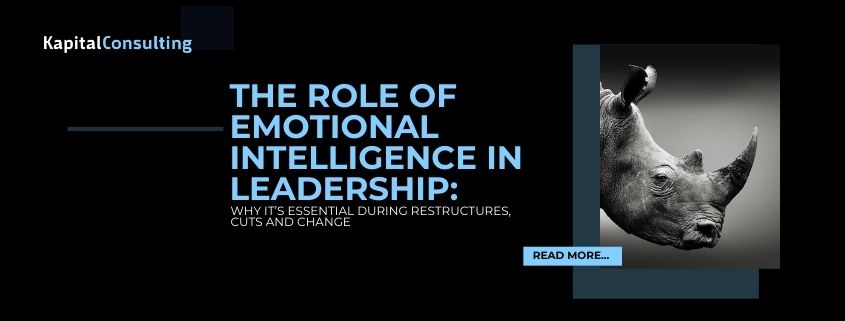The Role of Emotional Intelligence in Leadership: Why It’s Essential During Restructures, Cuts and Change
In the world of BFSI, many senior leaders are stepping into roles not to maintain, but to change. Whether it’s driving transformation, delivering cost efficiencies or restructuring entire functions, the message from the top is clear: fix it.
But org restructures or technology uplifts one thing often gets lost: the people.
If you’re making changes that affect teams – cuts, realignment or absorbing functions, emotional intelligence (EQ) isn’t a nice-to-have. It’s a must.
You’re Not Just Moving Boxes on an Org Chart
Leadership during a restructure is not just about timelines and handovers. You’re dealing with individuals, often in close-knit teams, who are losing colleagues, role clarity and in some cases, their sense of safety at work.
They’re watching closely. They notice how it’s communicated. They notice how their colleagues are treated on the way out. They remember who was transparent and who disappeared when things got uncomfortable.
Restructures done without emotional intelligence don’t just impact the people leaving. They drain the energy and are the decision of people staying.
What Emotional Intelligence Looks Like During Change
EQ in leadership isn’t about being soft. It’s about being self-aware, emotionally attuned and communicating with intent. In periods of uncertainty and change, it’s what separates a respected leader from one who’s barely tolerated.
Here’s how it plays out in practice:
- Anticipating team reactions before a restructure is announced, rather than reacting to the fallout
- Acknowledging the human impact of decisions, not just the commercial logic
- Having direct conversations with those affected, even when it’s hard
- Clearly explaining the ‘why’ behind decisions, so the team doesn’t have to fill the gaps with assumptions
- Following up with the team after changes land, to rebuild trust and refocus direction
These aren’t fluffy leadership hacks. These are foundational moves that protect morale, prevent passive attrition, maintain momentum and build trust.
Don’t Forget the Global Teams
Restructures often involve globally distributed teams – Singapore, London, New York etc. Yet too often, those outside HQ are left out of the loop or are the last to know about changes.
If you’re making structural or leadership changes, you need to lead globally, not just locally.
Best practice includes:
- Running full team calls (Zoom/Teams) to align on changes and future direction, with time for Q&A, even the tough stuff
- Rotating call times to avoid excluding one region from every key update
- Following up in writing with clear takeaways for all regions, especially when time zones prevent full attendance
- Making regional managers part of the change narrative, not just the delivery chain
You can’t retain what you don’t include. And right now, global capability is a competitive advantage, don’t lose it to poor communication.
Retention is Your Hidden KPI
You can restructure. You can reset. You can deliver change. But if your high performers quietly exit in the six months that follow, you haven’t succeeded, you’ve just shifted the problem.
- Retention isn’t just about salary. It’s about belief
- Belief in the direction
- Belief in the leadership
- Belief that people matter – even when change is hard
The best leaders keep people aligned not just through logic, but through trust. Emotional intelligence is how that trust is built and how it survives structural change.
Lead the Change, Don’t Just Execute It
You might be in the role to make hard decisions. But how you deliver those decisions is what defines you as a leader.
- You can restructure and still retain.
- You can deliver tough news and still build trust.
- You can lead with accountability and empathy.
You were hired to get a job done. Maybe that job involves cuts, stepping into a team that’s burnt out, or resistant to change. Maybe it means resetting expectations after years of overwork, under-delivery or “just surviving”.
But you won’t do it alone.
If you want your role to succeed, your people need to feel safe, supported and heard.
You can be commercially sharp and emotionally intelligent.
Because you’re not just fixing processes.
You’re rebuilding trust.
 Shannon Stobbs – Manager – LinkedIn
Shannon Stobbs – Manager – LinkedIn
Kapital Consulting is a niche Finance Technology Recruitment Business specialising in Technology, Project Services and Data Recruitment across Australia. For more information connect with us on www.kapitalconsulting.com.au and follow us on www.linkedin.com/company/kapital-consulting



